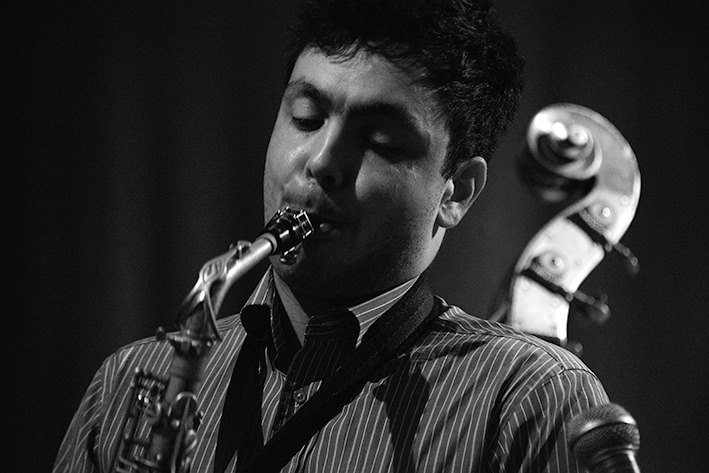Martin Longley reports on jazz saxophonist Tom Harrison’s film music project.
Tom Harrison
The Bartons Arms
Some of Tom Harrison’s band sidemen are more familiar to seasoned UK jazz fans than the leader himself, but the London saxophonist’s film music project will doubtless contribute to improving his own profile. It’s the kind of conceptual set-up that is likely to appeal to promoters looking for a unique direction, and will be particularly appealing for festival programmers.
The Birmingham Jazz team made one of their occasional forays to a different pub, moving from the Red Lion in the Jewellery Quarter to the Barton’s Arms, which is a few steps away from the Drum arts centre in Aston. This is one of the most impressive quafferies in Birmingham, both architecturally, and in terms of its beery contents, courtesy of Oakham Ales.
The gig was staged in the upstairs room that has long hosted jazz gigs, stretching back three decades to drummer Tony Levin’s fondly-remembered guest-inviting sessions. The space is ideal, but one small gripe is that the heavy reservation of all the room’s large round tables had the effect of creating an atmosphere of established exclusivity, as a first impression given to the newcomer.
The original idea was to allow more stage-space for Robert Mitchell’s piano, but in the end he decided to bring along his electric keyboard. Mitchell is a renowned bandleader himself, not averse to conceptual compositions. Completing the quartet were bassist Ryan Trebilcock and drummer Dave Lyttle, the latter coming across from Ireland. The bass position was originally advertised as being taken by the American-in-London Michael Janisch, who was later replaced by Larry Bartley, with Trebilcock making the ultimate fleshly appearance. This was no massive disappointment, as he’s one of the finest players on the scene, long a regular player in Birmingham.
Harrison adopted a very personalised approach to selecting the movie themes used as his inspiration and impetus. The first piece was of suite-length, stretching to around 30 minutes, Scrambled Egos responding to the Stateside chemistry teacher/crack-dealer black comedy series Breaking Bad. Except that Harrison’s work didn’t particularly evoke the mood of that show, sounding light rather than dark, mellow as opposed to tense.
Nevertheless, that didn’t prevent Harrison’s themes from being engaging. Percussionist Lyttle immediately gripped the attention, his resourceful techniques adding a sense of unpredictability, as he made sharp cymbal-scrapes, rim-rattles and suddenly dropped the sticks to play with his hands. Next up was a response to John Carpenter’s Halloween, which avoided calling to mind the original music, but once again provided something else of satisfying substance.
The first set’s best playing, in terms of ensemble thematic development and individual soloing was The Shadow Of Your Smile, taken from The Sandpiper, a 1965 flick which featured Richard Burton and Elizabeth Taylor, with the song popularised by Tony Bennett. The condensed melodic substance acted in sharp contrast to the leisurely unwinding of the previous pieces, making a strategically strong move towards convention which was actually quite arresting. Again, Lyttle was making fast hand-flashes, this time across the hi-hat, and Harrison delivered his most striking alto solo of the set, providing a suitable climax.
The second set had another surprise in store, with a funked-up strut through Star Wars. These are not the themes that we’d normally expect from a film music project, particularly not nestled together. The Sandpiper meets Star Wars? Where else could we savour such a choice pairing?
Photos – Brian Homer
